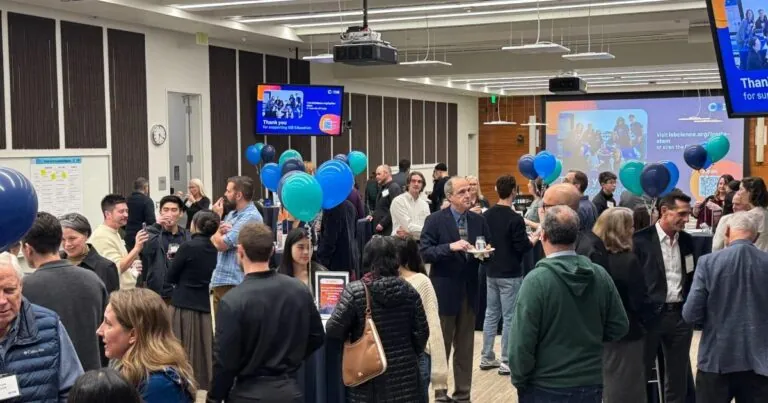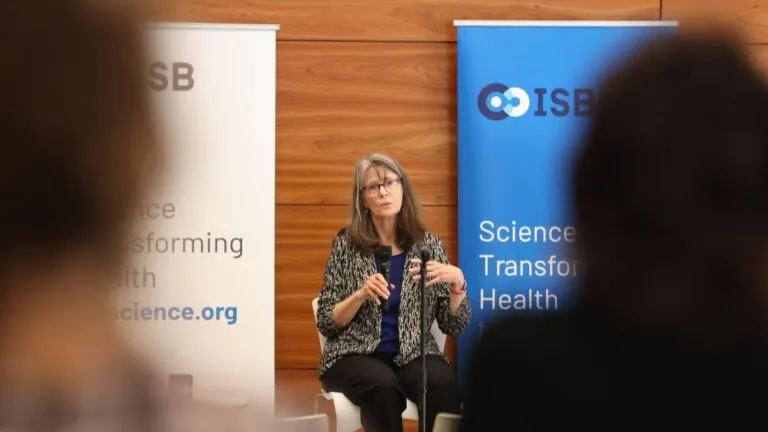Get to Know Miranda Johnson, ISB’s First-Ever AmeriCorps Member
This past fall, AmeriCorps member Miranda Johnson packed her bags and left her home state of Illinois to join ISB as a Systems Thinkers in STEM Coordinator. Johnson is the first AmeriCorps member at ISB, so we had quite a few questions about how she got here, her experience thus far, and her future plans.

This past fall, AmeriCorps member Miranda Johnson packed her bags and left her home state of Illinois to join ISB as a Systems Thinkers in STEM Coordinator.
Johnson is the first AmeriCorps member at ISB, so we had quite a few questions about how she got here, her experience thus far, and her future plans.
Read the Q&A below and get to know Miranda Johnson.
ISB: How long have you been in the AmeriCorps?
Miranda Johnson: This is my first service term through AmeriCorps! So, as of January 1, I’ve been an AmeriCorps member for about three and a half months.
ISB: Why did you join?
MJ: After graduating college, I spent the summer exploring what I wanted to do with the beginning of my career. I was working for an environmental nonprofit based in the Chicago area, but I decided that I wanted to move out of Illinois after spending my entire life and college career there, and come out to the Pacific Northwest. I felt that the AmeriCorps opportunities would be a great way to get my start in a brand new city, pick up new skills, and get a sense of the nonprofit scene in Washington state. It’s also a great chance for people who are early in their careers to try out a bunch of different projects and areas of interest to get a better sense of what they want to do moving forward. Similarly, I’ve known for a while that I want my environmental career to be grounded in some aspect of direct service to people and the planet, so the service opportunities offered through AmeriCorps are a great way to set that precedent for myself.
ISB: What is your experience like?
MJ: My experience with the Washington Service Corps has been really educational so far. I really enjoy having the opportunity to focus on projects where I can take the lead and mold stewardship project opportunities for students. It’s also nice to have a connection to a community of members working through the Washington Service Corps, as well as through the nationwide AmeriCorps program. We recently had a week of training with a couple hundred WSC members in the state, where we got to network with one another and set up methods of communication to connect our different projects.
ISB: How did you find your way to ISB? What was it that attracted you to ISB?
MJ: I came across ISB on the AmeriCorps application portal page, and was intrigued by the ability to work on environmental stewardship projects and STEM education in a scientific research environment. In college, I chose the social science track of my degree because my previous theatre training more adequately prepared me for that concentration, but I’ve always been really interested in the STEM side of environmental work. ISB seemed like the perfect opportunity to be in a scientific environment where research is being performed to make impactful changes in our approach to environmental issues, while getting to work with students to foster a passion to enter into this sort of field. Another factor in my journey to ISB was the opportunity to meet a couple of the members of the Systems Education Experiences team in the interview process, and I felt like I really could see myself feeling happy and excited to work alongside these individuals. Overall, ISB seemed like a great fit because my ultimate goal was to perform fulfilling and impactful work, and ISB seemed to be the right environment for those goals.
ISB: What projects are you working on?
MJ: My primary project at ISB is as the Systems Thinkers in STEM Ambassador Coordinator. The Systems Thinkers in STEM Ambassador program allowed high school students to take courses with ISB educators and scientists that taught them about systems thinking through the lens of systems medicine, bioengineering, computational modeling, etc. I’m currently working with 15 of the students who completed both tiers of the Ambassador program and want to implement an environmental stewardship project in their school or community. I meet with each of the students on a regular basis, provide them resources and information from ISB, and mentor them through the process. At the end of their projects (and my service term), we will display their work on the ISB SEE website and hopefully encourage the students and the community members/students they worked with to commit to being environmental stewards in their own lives! Eventually, we’d also like to create a program for students at local schools to get involved in groups with ISB-mentored environmental stewardship projects. I’m also helping to create the online showcase of the larger group of Tier 2 Ambassadors, and to coordinate its roll out on social media and the website over the next eight months, among other exciting things!
(Follow SEE on Facebook and Twitter and Instagram.)
ISB: How long is your stay here? Is extending your time at ISB a possibility and/or part of your plan?
MJ: The AmeriCorps service term lasts for about 11 months, so I will be at ISB until the end of July 2022. Through AmeriCorps, members have the option to extend their service term over a maximum of five years. I believe the decision to extend my time at ISB will be one that is discussed later in my term, to see what the best option will be!
ISB: What do you hope to accomplish in your time at ISB?
MJ: While at ISB, I’m hoping to wrap up a bunch of student projects and be able to feature them all on the website to inspire future students to take the lead on projects that promote environmental stewardship in their own communities. I hope to inspire some students to make environmental issues a large part of their future career goals. And I hope to develop a lot of great new skills and knowledge that will make me a better professional in the environmental education field and STEM.
ISB: Have you had any notable experiences you can share from your first few months?
MJ: One of the students that I’m working with has already implemented an entire hydroponic growing system at a local food bank in Texas! Her project is well-designed, thoroughly researched, and grant-funded, and she’s such a great student to work with. Her ultimate goal is to provide fresh food for the food bank from her growing system, and to conduct an educational outreach event for the community that will teach people about systems thinking and sustainable agriculture, while simultaneously acting as a fundraiser for the food bank. I’m really enjoying helping her plan out her process, and it’s been a big highlight so far to have someone successfully complete one of the major steps of their project so early in the process!
ISB: Where are you from originally?
MJ: I grew up in Aurora, Illinois, a suburb of Chicago that’s about 40 miles west of the city. In my last year of college, my family moved to the South Loop neighborhood of Chicago, so I also lived there for the last summer that I spent at home before moving to the West Coast.
ISB: What is your education trajectory? Where did you attend college? Degree?
MJ: I attended college at the University of Illinois at Urbana-Champaign, and graduated in May with a bachelor’s in earth, society, and environmental sustainability (with a concentration in society and environment), a minor in business, and a certificate in environmental writing. Initially, I applied to college as an acting major in the theatre department, and pursued that program as well as my business minor for the first two and a half years. In the first couple months of my junior year, after making it through the second year cut process and entering the more intensive studio years of the program, I attended my campus’s climate march, coordinated by the Students for Environmental Concerns club to occur during the global climate strike in September of 2019. Something clicked while protesting for the university’s divestment from fossil fuels, inspired by my slowly growing awareness of the current climate crisis. That semester, I had a bit of a revelation that I needed to pivot my career goals (which had been arts-related for as long as I could remember) to do something that would allow me to play my part in the fight against climate change. I realized I felt unfulfilled in my current career path, and like I wouldn’t be able to fully fight for the issues I cared about through art. So, I took the plunge and switched majors, and completed the remainder of my minor as well as the entirety of my degree and certificate in the last three semesters of school. I also had the opportunity to complete two internships while in college, one at Seaside Sustainability based in Gloucester, Massachusetts, and another at the Illinois Food Scrap Coalition. During my second semester of senior year, I got to work half-time at the Oak Park, Illinois-based environmental non-profit, Seven Generations Ahead, for a six month contract.
ISB: What are your career and life aspirations?
MJ: Due to my late transition into this career path, I’m still figuring out exactly where I see myself ending up in the next couple of years, career-wise. AmeriCorps has given me a great opportunity to navigate that transition. My past internships and work experience allowed me to try out a ton of different disciplines, such as environmental policy, marketing and public relations, and non-profit management, but now through ISB I get to learn about environmental and STEM education and work with the next generation of environmental professionals. I know that working at an environmental non-profit is my end goal, so I’m really just taking every opportunity I can to learn about all of the ways that I can contribute to this field of work. I love to face new challenges and learning opportunities, so any opportunity to do that will be in line with my ultimate life aspiration to feel fulfilled in what I do, and to do work that is making a positive impact.
ISB: What might come next after ISB and AmeriCorps?
MJ: If I don’t continue with ISB and/or AmeriCorps after the end of my term, I definitely want to continue working with non-profits in the area! The Pacific Northwest has a great community of organizations that are focused on environmental issues, so I definitely think there are lots of great options.
ISB: What do you think of Seattle?
MJ: So far, I really love Seattle. I’ve been here since the beginning of August, and every time I’ve been able to get out into nature has been so amazing. I grew up and went to school in Illinois, so I’m definitely used to flat land as far as you can see and lots of cornfields! I love the mountains and the proximity to the ocean and all of these outdoorsy activities, it’s really a different city living experience than in Chicago! And I don’t think I’m going to miss the freezing temperatures and polar vortexes back at home!


